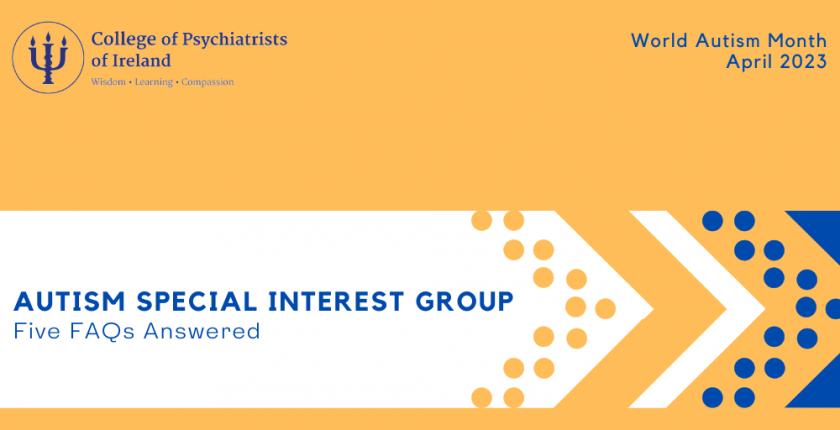Blog
World Autism Month 2023: CPsychI Autism Special Interest – FAQs Answered
- April 11, 2023
- Posted by: Ian Rice
- Category: Blog External Affairs & Policy Public Information Stakeholders

For World Autism Month 2023, the College Autism Special Interest Group have put together a number of articles that may of interest to our colleagues. These articles will be published across the month of April.
Below are some FAQs on the work of the Autism Special interest Group (SIG) and the ways in which psychiatry and the needs of autistic people intersect.
Who makes up the Autism Special Interest Group and what is their main focus?
The College Autism SIG is made of up Consultant and Trainee Psychiatrists who are working or have an interest in the area of autism and mental health service provision, as well as an autistic representative from Ireland’s National Autism Charity AsIAm. The Autism SIG is focused on raising awareness of mental health difficulties of autistic people and advocating for the provision of appropriate, timely and accessible psychiatry services that meet their needs.
Do autistic people have increased mental health needs?
Autism is a neurodevelopmental condition that affects approximately 1.5% of the population. It is seen as a disability, particularly impacting on social and communication ability, patterns of interest and sensory motor sensitivities. Autistic people need supports and adaptations to access education, employment and to engage fully in society. A very large proportion of autistic people also have co-occurring mental health conditions, estimated to be 50-60% in some studies. Typically, these include attention deficit hyperactivity disorder, mood and anxiety disorders, social anxiety and social phobia. More seriously, autistic people are up to 9 times more likely to die prematurely by suicide, which affects autistic females disproportionately.
Can autistic people access support for their mental health needs?
Autistic people experience a number of barriers in accessing supports for their mental health needs. They may have greater difficulty talking about their mental health and they don’t always show how they are feeling in a way that neurotypical people understand. As a result other people, including health care professionals, may not notice their mental health difficulties. Sometimes it is difficult for mental health professionals to differentiate between autism and mental health needs which can lead to their mental health problems being viewed as ‘just autism’. This can mean that an autistic person may face barriers in getting referred to a psychiatry service. Also, some mental health professionals report that they have difficulties knowing how to communicate well with an autistic person.
What does the Autism SIG plan to do to address these barriers?
Our Autism SIG has completed a survey of mental health professionals regarding their knowledge, awareness and training needs in relation to autism. These data are in the process of being analysed for publication. We hope that this information will inform future frameworks for training in psychiatry. We also continue to raise awareness and engage in discussion regarding key issues that arise for autistic people in the context of psychiatry services.
What’s the Autism SIG’s key message about autism and mental health?
Our key message is that autistic patient’s mental health needs are as significant as every other services user’s. We want psychiatry services to focus on how we can best meet the needs of autistic people to promote better mental health and outcomes. A diagnosis of co-existing Autism should not cause our colleagues to feel nervous or out of their depth when treating patients. We hope to broaden the training experience of our Basic and Higher Specialist Trainees to include autism-adapted approaches to assessment and treatment planning, alongside continued work with the HSE in developing a care pathway for autistic patients for both physical and mental illnesses.
